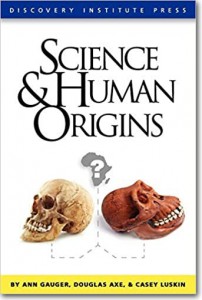Dr. Ray Bohlin provides an overview of the first section of a landmark book on theistic evolution, showing why evolution doesn’t hold up to scrutiny.
Three Good Reasons for People of Faith to Reject Darwin’s Explanation of Life
In this article I’m discussing the first of four sections in the book, Theistic Evolution: A Scientific, Philosophical, and Theological Critique.{1} I’ll be covering five chapters from the section, “The Failure of Neo-Darwinism.” First we’ll look at Doug Axe’s chapter titled, “Three Good Reasons for People of Faith to Reject Darwin’s Explanation of Life.”
I need to let you know from the start that I totally disagree with any theistic evolutionary perspective. As a biologist, I see no reason for any accommodation since Darwinism should be rejected on purely scientific grounds.
But moving along, Axe makes three points in this chapter. First, that there is a cost to any theistic evolution position. Second, Darwin’s view of life is false. Third, the reasons for the accommodation are confused. I want to focus on his first point that accommodating Darwin’s view of life within traditional faith is costly. He begins with a familiar quotation from the Book of Job 39:26-27. “Is it by your understanding that the hawk soars and spreads his wings toward the south? Is it at your command that the eagle mounts up and makes his nest on high?” Eventually, Job was appropriately humbled as he responded later in Job 42:3, “I have uttered what I did not understand, things too wonderful for me, which I did not know.” And if you don’t agree, then you should try to make an eagle. Oh, we can create flying toys with flapping wings and all, but these don’t come close to an actual eagle or hawk. These toys must be made on an assembly line with humans adding parts until the “eagle” is complete. With only the yolk and white of the egg as its nutrition, true eagles are formed within the egg by a seamless automated process. No human interference needed.
If a part breaks in the flying toy, it must be replaced by a human. Eagle’s bodies can mostly heal themselves and true eagles reproduce on their own. No flying toy will ever reproduce itself. Job’s response was correct. He didn’t respond, saying “Actually, God, hawks and eagles could have appeared by accident over millions of years.” As Doug states, “I see no way around the fact that the arresting awe we’re meant to have for the maker of the majestic eagle is lost the moment we accept that accidental physical processes could have done the making instead Neo-Darwinism and the Origin of Biological Form and Information Now we turn to discussing Stephen Meyer’s chapter on the origin of biological form and genetic information.
Neo-Darwinism and the Origin of Biological Form and Information
Before we begin, I need to discuss what a body plan is. The body plan of an animal is the overall structure of the body. For instance, the butterfly and the polar bear have very different body plans. The butterfly has its skeleton on the outside, what’s known as an exoskeleton. The polar bear has an endoskeleton; the skeleton is on the inside of the body. Butterflies have wings, polar bears don’t. In fact, all the major organs, limbs and other body parts are arranged very differently. So, each of these animals will need to form along very different pathways to arrive at the final product. The question becomes, “How does the evolutionary process form such different body plans from similar beginnings?”
Studies in developmental biology, the study of how organisms develop from fertilized egg to final product, show that changes in biological form require attention to the timing, especially those steps involved in developing the body plan. Also, there is a need for careful choreography in the expression of genetic information, not just when, but how much, how long lived, the proper sequence.
There are real problems here for Neo-Darwinism. Major evolutionary change requires changes in the body plan which is formed very early in embryonic development. So, mutations need to occur early. Mutations that may occur late have no effect on body plan. But numerous studies have shown that early mutations are inevitably lethal. Late mutations don’t produce body plan changes. As Meyer puts it, “The kind of mutations we need, we don’t get. The kind we get, we don’t need.”
There isn’t just a need for new genes and proteins for new functions of the organism. Polar bears can endure freezing temperatures, butterflies can’t. But new regulatory pathways are needed. Early development is controlled by developmental gene regulatory networks, or dGRNs. These networks regulate the time and perform the choreography. Any mutations here are always inevitably lethal. Neo-Darwinism can’t explain the origin of new animal body plans.
Are Present Proposals on Chemical Evolutionary Mechanisms Accurately Pointing toward First Life?
Now we will review Dr. James Tour’s discussion on the origin of life. Dr. Tour is the foremost authority on organic chemical synthesis. That is, he makes chemical products based on the element carbon. This background makes him just the scientist to critique the chemical origin of the first life, since life is also based on the element carbon.
Tour begins by describing the start and stop necessity of making something as simple as a carbon-based car and a car that also contains a motor and then an even better motor. These nano cars take many steps to build. Usually Tour and colleagues run into a roadblock necessitating, before moving to the next step, that they back up several steps and redirect the process. He also documents that each stage usually requires different chemical requirements. This makes it necessary to purify your product. What he demonstrates is that making something comparably simple as a nano car requires intelligent input at every step. This will not happen by chance. Tour emphasizes that the undirected chemical synthesis to make useful biological molecules, and even a cell, is far more complex with no opportunity to start over again when you hit a dead-end.
After walking the reader through the many and enormous roadblocks a prebiotic chemist faces in trying to form the building blocks—sugars, amino acids, fatty acids, and nucleotides—and then the macromolecules; carbohydrates, proteins, lipids, DNA and RNA, and then trying to assemble these very different parts into a functioning, reproducing cell, Tour comes to a final conclusion.
“Those who think scientists understand how prebiotic chemical mechanisms produced the first life are wholly misinformed. Nobody understands how this happened. Maybe one day we will. But that day is far from today. It would be more helpful (and hopeful) to expose students to the massive gaps in our understanding. Then they may find a firmer—and possibly a radically different—scientific theory.”
Why DNA Mutations Cannot Accomplish What Neo-Darwinism Requires
Now we discuss Jonathan Wells’s chapter on why DNA mutations are insufficient to account for the arrival of new organisms through evolution. Mutations acted on by Natural Selection are what provides the variation, when given enough time and continued mutations with selection, to provide new types of organisms.
Dr. Wells begins his chapter by making sure we understand what is meant by the “Central Dogma.” It goes something like this: DNA makes RNA, makes protein, makes us. It was thought that all the instructions for building organisms was in the sequence code of DNA. But DNA never leaves the nucleus. The sequence of DNA that codes for a protein is transcribed into a molecule of RNA. The messenger RNA then leaves the nucleus and enters the cell, where molecular machines called ribosomes, translate the RNA code into protein code. Proteins are made of long chains of amino acids. Proteins are the workhorse of the cell. They speed up necessary chemical reactions the cell needs and provide structure and support. Our bodies are composed of organ systems, which are made up of organs, which are composed of tissues, and tissues are composed of cells that perform their functions through the proteins each cell makes. Therefore, DNA makes RNA, makes protein, makes us.
Over the last few decades, this analogy has fallen apart. Initially, a stretch of DNA that coded for a single protein was called a gene. One gene, one protein. We now know that the RNA transcribed from a gene can be split up into two or more segments and these segments put back together in several different ways. The RNA then doesn’t match the original sequence of DNA. About 95% of human genes can be spliced into more than one RNA and more than one protein. Proteins can also be modified with sequences of sugar molecules that are specific to a particular tissue. What controls the splicing and the addition of sugar molecules is still not fully known. But for various reasons, it’s not the DNA alone that determines these variations on a central theme.
Evidence from Embryology Challenges Evolutionary Theory
Finally, I’ll cover the final chapter for this article, “Evidence from Embryology Challenges Evolutionary Theory.” Sheena Tyler states early that Darwin thought that “Embryology is to me by far the strongest class of facts in favor of change of form.”{2} Tyler goes on to indicate that in Darwin’s time, embryology was largely a black box of which little was known.
The section I’ll be covering is titled “Development is Orchestrated.” Tyler makes a comparison to a mystery novel where the author plans to ensure the different characters come together at the right place and time to resolve the mystery. Embryological development is very much like that. She mentions a four-dimensional pattern of stored information. The first three dimensions of this pattern revolve around being in the right place, the fourth dimension is time. So embryological proteins, chemicals and even electrical fields need to be available at the right time and place. Any deviation and the structures are ill-formed, or the embryo could even die.
Skeletal development in vertebrates starts with an electrical field that begins the process. And from there she quotes an embryologist indicating that the size and shape of skeletal elements in the embryo are “exquisitely regulated.” Another word used to describe the sequence of events is “precise.” This doesn’t sound like something that was cobbled together by chance over a few million years. There is a definite plan and prepattern that must be followed.
The central nervous system requires, again, a “precise and exquisitely regulated gene expression.” Another expression used is “intricately orchestrated.” Each developing neuron anticipates where a connection with another neuron will need to be before contacting the other neuron.
Last, she mentions the heart and circulatory system. One embryologist reports that cardiac transcription factors (small proteins that help initiate the expression of a gene) choreograph the expression of thousands of genes at each stage of cardiac development. Every blood vessel ends up in the right place every time along with the proper architecture for veins or arteries. Just amazing!
Notes
1. J.P. Moreland, Stephen C. Meyer, Christopher Shaw, Ann K. Gauger, and Wayne Grudem, Theistic Evolution: A Scientific, Philosophical, and Theological Critique. Wheaton, IL: Crossway, 2017.
2. Quoted in Sheena Tyler, Evidence from Embryology Challenges Evolutionary
Theory, in Theistic Evolution: A Scientific, Philosophical, and Theological Critique, Moreland, J.P., Meyer, S.C., Shaw, C., Gauger, A. K., and Grudem, W., editors.
©2022 Probe Ministries

 First I’d like to discuss the first chapter by Ann Gauger. Ann is a research scientist with Biologic Institute with laboratory experience at Harvard and the University of Washington. Initially Ann points out two things that are necessary for there to be a link by common ancestry between humans and some ape-like ancestor. First there must be a step-wise adaptive path to follow. Neo-Darwinism depends on a slow, gradual path between two forms, genes or proteins. Rapid large jumps are likely to be too disruptive to the organism’s state of being. Either survival or reproduction will be compromised.
First I’d like to discuss the first chapter by Ann Gauger. Ann is a research scientist with Biologic Institute with laboratory experience at Harvard and the University of Washington. Initially Ann points out two things that are necessary for there to be a link by common ancestry between humans and some ape-like ancestor. First there must be a step-wise adaptive path to follow. Neo-Darwinism depends on a slow, gradual path between two forms, genes or proteins. Rapid large jumps are likely to be too disruptive to the organism’s state of being. Either survival or reproduction will be compromised. Let’s see. This morning I chose my black t-shirt, tan dress slacks, black shoes, and black socks. After gathering all my things for the trip to the office, I put on my now-famous Grand Canyon felt hat and headed out the door, deciding I didn’t need an umbrella for the short walk in the rain.
Let’s see. This morning I chose my black t-shirt, tan dress slacks, black shoes, and black socks. After gathering all my things for the trip to the office, I put on my now-famous Grand Canyon felt hat and headed out the door, deciding I didn’t need an umbrella for the short walk in the rain.